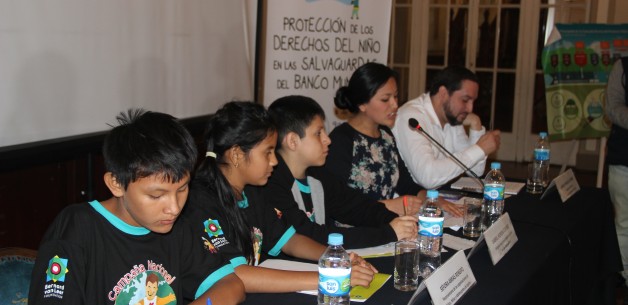This post is also available in: Spanish
BIC Panels Explore Challenges and Ways Forward Around World Bank-Funded Mining Projects
During the recent World Bank and IMF Annual General Meetings (AGM) in Lima, Peru, BIC’s Child Rights Program co-sponsored two events to discuss the World Bank’s engagement in mining projects in Peru and their impacts on children.  Along with Save the Children, BIC co-sponsored a panel to discuss their joint research project on Yanacocha and Conga, mines in which the IFC, the World Bank Group’s private investment arm, has held a long standing equity interest. This panel brought together a diverse group of commentators from the private sector, civil society, World Bank, and the Catholic Church. Panelists included Morgan Landy, Director of the Environmental, Social and Governance Team at the IFC, Carlos Scerpella, Senior Human Rights Specialist with Newmont, as well as Monsignor Pedro Barreto, an archbishop from another region in Peru who has been a longtime advocate for children impacted by mining projects in the country.
Along with Save the Children, BIC co-sponsored a panel to discuss their joint research project on Yanacocha and Conga, mines in which the IFC, the World Bank Group’s private investment arm, has held a long standing equity interest. This panel brought together a diverse group of commentators from the private sector, civil society, World Bank, and the Catholic Church. Panelists included Morgan Landy, Director of the Environmental, Social and Governance Team at the IFC, Carlos Scerpella, Senior Human Rights Specialist with Newmont, as well as Monsignor Pedro Barreto, an archbishop from another region in Peru who has been a longtime advocate for children impacted by mining projects in the country.
The panel commenced with a presentation by Javier Mujica on the impacts of the mines on children—including missed time in school, devastating health problems, increased sexual abuse and human trafficking, and living in a constant state of fear from the protracted social conflict around the proposed expansion mine. Javier’s presentation also included recommendations based on international human rights law, and specifically the Convention on the Rights of the Child, in order to better protect the rights and interests of children in the region and everywhere that mining projects are carried out.
 BIC’s child rights program also participated in the civil society-sponsored Alternative Platform. Together with INFANT and Save the Children, BIC sponsored an event that included two panels. The first panel featured children that participated in BIC’s children’s consultations around the World Bank safeguards review. They were joined by Alfredo Pérsico Gutiérrez, a psychologist and champion of child rights in Peru. The panelists discussed the importance of listening to children, and including them in the design and implementation of development projects and programs. The children made strong presentations clearly demonstrating that they can be strong advocates for their own rights and interests, and that they have valuable opinions on difficult and complicated issues associated with development. Listen to some of their presentations and interviews (in Spanish only) here:
BIC’s child rights program also participated in the civil society-sponsored Alternative Platform. Together with INFANT and Save the Children, BIC sponsored an event that included two panels. The first panel featured children that participated in BIC’s children’s consultations around the World Bank safeguards review. They were joined by Alfredo Pérsico Gutiérrez, a psychologist and champion of child rights in Peru. The panelists discussed the importance of listening to children, and including them in the design and implementation of development projects and programs. The children made strong presentations clearly demonstrating that they can be strong advocates for their own rights and interests, and that they have valuable opinions on difficult and complicated issues associated with development. Listen to some of their presentations and interviews (in Spanish only) here:
The event also included a panel of adults that discussed research commissioned by BIC and Save the Children around the impacts of the World Bank Group-funded Yanacocha and Conga mines in northern Peru. Frank Boeren, the country director for Oxfam International in Peru,  as well as Federico Arnillas, the President of the Roundtable for Poverty Reduction commented on the research presented by Javier Mujica, President of Peru Equidad. Mr. Mujica’s presentation included recommendations for the World Bank and Newmont, the American mining company involved in Yanacocha and Conga, on how to avoid and mitigate impacts on children that are commonly associated with extractive industry projects.
as well as Federico Arnillas, the President of the Roundtable for Poverty Reduction commented on the research presented by Javier Mujica, President of Peru Equidad. Mr. Mujica’s presentation included recommendations for the World Bank and Newmont, the American mining company involved in Yanacocha and Conga, on how to avoid and mitigate impacts on children that are commonly associated with extractive industry projects.
The panel discussions highlighted several areas of common ground between these diverse stakeholders, most importantly that that the needs and interests of children must be addressed in the context of mining operations. The panelists also identified several areas where further work must be done to ensure that children’s rights are protected. Several of the panelists at both the civil society policy forum as well as the Alternative Platform pointed out that children’s rights can often be overlooked in the mining context, and a concerted effort must be made to include them in the design and implementation of these projects.
We look forward to continued dialogue and engagement by all of the parties involved in these important discussions, and we are hopeful that these conversations can lead to better policies and practices that can effectively protect and engage this very important group of stakeholders.


